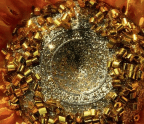John Divola & Mark Ruwedel


“Los Angeles isn’t a city,” wrote Eve Babitz. “It’s a gigantic, sprawling, ongoing studio.” The photographs of John Divola and Mark Ruwedel might just prove her point. A native Angeleno based in Riverside, Divola often utilizes and activates spaces found in his immediate environment—from an abandoned residence on Zuma Beach to derelict desert houses. Since the 1970s, he has incorporated modes of intervention and improvisation (often involving spray paint) into his photographs, a process that reveals his presence while also synthesizing the conceptual and evidentiary quotients of the medium.
For Ruwedel, who moved to Long Beach in 2002, Los Angeles County presents limitless photographic possibilities. Relocation to Southern California put him within proximity of the American West landscapes that feature frequently in his investigations of how human activity and historical events register on the environment. His recent projects address the tension between nature and culture visible across the city.
Last spring, curator Amanda Maddox spoke with Divola and Ruwedel about their distinct but related practices, their attraction to the desert, and their preferred means of traversing Greater Los Angeles (read: Nissan Xterra) in pursuit of compelling subjects.

Amanda Maddox: I’m curious about your different perspectives on Los Angeles. John, you’re a native who’s seen the city evolve over the course of your life. And Mark, you’re a transplant who arrived with some idea of the American West. Did that hold up?
: I grew up with this idea that California was the golden land. My parents, when they moved back to Pennsylvania from National City, regretted it their whole lives.
You’re reading a preview, subscribe to read more.
Start your free 30 days





